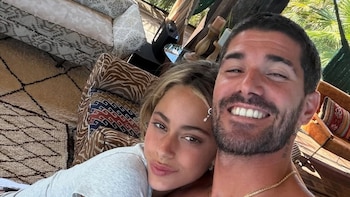
The Tuesday Talk Is Presented by
Helios Partners
(ATR) Golf is returning to the Olympic program for the first time since 1904. It’s International Golf Federation executive director Antony Scanlon’s job to keep the sport there.
With Rio de Janeiro's course decision now out of the way, Scanlon tells Around the Rings what's left for his sport to do ahead of 2016 – not only to ensure a successful return to the Games program but also to cement its spot as an Olympic mainstay.
Around the Rings:Rio 2016 announced during last week's IOC Coordination Commission visit that golf's Olympic return will be staged on a new course rather than one of the two private 18-hole offerings already in existence in Rio. When will course construction be complete?
Antony Scanlon: What we’re hoping to do is a fairly elaborate test event in the first quarter of 2015, which would have on the men’s side probably the top players in the world participating and then similarly another event on the women’s side a month or so later.
That way, we have the opportunity for the athletes most likely to be competing the following year to be able to play on the course and then if we need to make any modifications, it gives us time to do so.
ATR: Golf is on the Olympic program, but Rio is still five years away. What must the IGF accomplish in the meantime to ensure a successful return to the Games?
AS: Obviously, the first thing is to honor our commitments to the IOC, and one of those was to ensure that the top players will be participating. As you will recall during the bid, we had the support of all the top players – Tiger Woods, Annika Sorenstam, etc. – and we still have that commitment from all the players, so we’re confident that will happen.
The second thing we committed was to ensure there was no conflict between any of the major events on the golf calendar with the Olympic program and that was also honored, so that ensures that the top players will be there.
And then the other thing we need to be doing is helping our national members with the national Olympic committees to develop the game, to broaden our base and increase participation but also come up with innovative and educational development programs and provide pathways to athletes and coaches and officials to go from the grassroots level up to the elite levels of golf, so to have young kids aspiring to play golf and aspiring to play eventually at the Olympics – and if they don’t, they’re still playing the game and involved in the game.
ATR: Barring injury or a failure to qualify, which top players have so far expressed an interest in teeing it up at Rio 2016?
AS: None of the athletes are going to be arrogant enough to assume that they’re going to be there. What they hope to be is to be at the top of their game and able to compete at the Olympics.
Between now and the Rio Olympics, you’ve got 20 opportunities to win a major, and there’s only one opportunity to win an Olympic gold. I think that sort of scarcity of opportunity raises everyone’s hopes and aspirations to compete at the Olympics.
ATR: Is there anything you can do to guarantee that top players make the trip to Rio, or will that ultimately come down to a) who qualifies and b) how much Olympic glory means to them?
AS: I think a couple of the commitments we’ve made in terms of making sure there are no clashes with any of the tours will ensure that top players are there. I think you’ve seen from other events such as the Ryder Cup the desire for golfers to compete for their country, and I think when the opportunity comes to represent their country at the Olympic Games, I’d be very surprised if a golfer would say, "You know what? I don’t want to take that opportunity."
I anticipate those that will qualify will seize that opportunitywith open hands.
ATR: What will the qualification process for Rio look like?
AS: What we proposed to the IOC during the bid is what we’re still looking at, and that is those that are within the top 15 in the world rankings with a limit of four per country would qualify, and then on top of that, outside the top 15 in the rankings, a maximum of two players per country until we fill the field of 60 players.
Our rough estimations of both the men and the women have approximately 28 to 30 different countries competing at this stage based upon their qualifications, which is pretty good.
ATR: Given the relative lack of popularity golf enjoys in South America as compared to North America, Europe or say Japan, Rio probably isn’t your first choice for a place to make your return. How do you make the most of the opportunity given the host city at hand?
AS: You know what? I think it’s a great choice to be honest with you because it’s a great opportunity to grow the game. Currently in Rio, there are two 18-hole courses that are both private and a small 9-hole course which is public and has been very well used in a social program in terms of developingkids’ golf and encouraging kids to turn up to school.
Hopefully, [Rio’s] choice for the course willhave a legacy component which will enable the course to have the opportunity to develop not only the grassroots but also the elite level.
Also, the PGA Tour is working with the Las Americas Tour to develop a professional tour in South America. In order to do that, we’re working very closely with the Brazilian Confederation of Golf on grassroots development programs that will show a pathway from the base level of participation in the game right through to providing opportunity for their elite golfers to either play in the Las Americas tour or ultimately the PGA Tour.
I think there’s a great opportunity to develop the game.
ATR: Have you been keeping in contact with rugby to check in on what they’re doing ahead of 2016?
AS: I think all 28 sports are in the same boat, to be honest with you. Rugby and ourselves are good friends, and I have personal friends working at the IRB, so obviously we help each other, but I must say that same support is being given by the other 26 sports on the program.
It’s a very united group of sports. The word I use pretty easily is solidarity. If we require any help or assistance or guidance as being the new people to the program, we receive that, either through ASOIF itself or through other CEOs or presidents from other federations. They’ve been very helpful.
ATR: You mentioned in Acapulco that one of the IGF’s main priorities is to incorporate national golf federations into the NOCs themselves because many countries have multiple golf federations. How do you go about determining which of those federations will represent a given NOC?
AS: The majority of those decisions have been made very amicably across all the national golf federations and the professional golf federations. In a majority of the countries, it’s the national member of the IGF that is assuming that role and that representation. Some countries are coming up with a combined federation which incorporates both the amateur and professional games.
ATR: What other challenges, organizationally and otherwise, must golf overcome to transition into an Olympic mainstay?
AS: [We must] provide an event which not only excites the players but also brings new people to the game. Especially in Brazil, you’ll have people that have never gone to golf before seeing it live, so it’s creating an experience for all those that will see the game for the first time at the Olympics since 1904 and providing the excitement and the enthusiasm that we want so people see that golf really does belong in the Olympic program and cements our position in the Olympic program.
Interview conducted by Matthew Grayson.
Últimas Noticias
Boxing’s place in the Olympics remains in peril as IOC still unhappy with the state of AIBA’s reform efforts
The IOC says issues concerning governance, finance, and refereeing and judging must be sorted out to its satisfaction. AIBA says it’s confident that will happen and the federation will be reinstated.

McLaren report to FIBA confirms abuses in the Mali women’s basketball program
The investigation could not “independently verify” allegations against FIBA president Hamane Niang, who has resumed his duties after stepping aside during the probe.

ATR Extra: 1st ISF U15 World School Sport Games – Belgrade 2021
Olympic Channel is live streaming the basketball, basketball 3x3, football, judo and wrestling competitions during the event, which runs September 11-19.

International Judo Federation bans Algerian athlete and coach for 10 years for refusing to fight an Israeli at Tokyo 2020
Judoka Fethi Nourine and his coach Amar Benikhlef admitted they were withdrawing from competition to avoid a potential match with Tohar Butbul of Israel.

IIHF bans Belarus hockey president for five years for code of conduct violations - Federation Focus
Also: no contested election for next ITTF president; BWF calendar shrinks as event in India cancelled due to pandemic; FISU announces early bids for 2027 and 2029 World University Games




